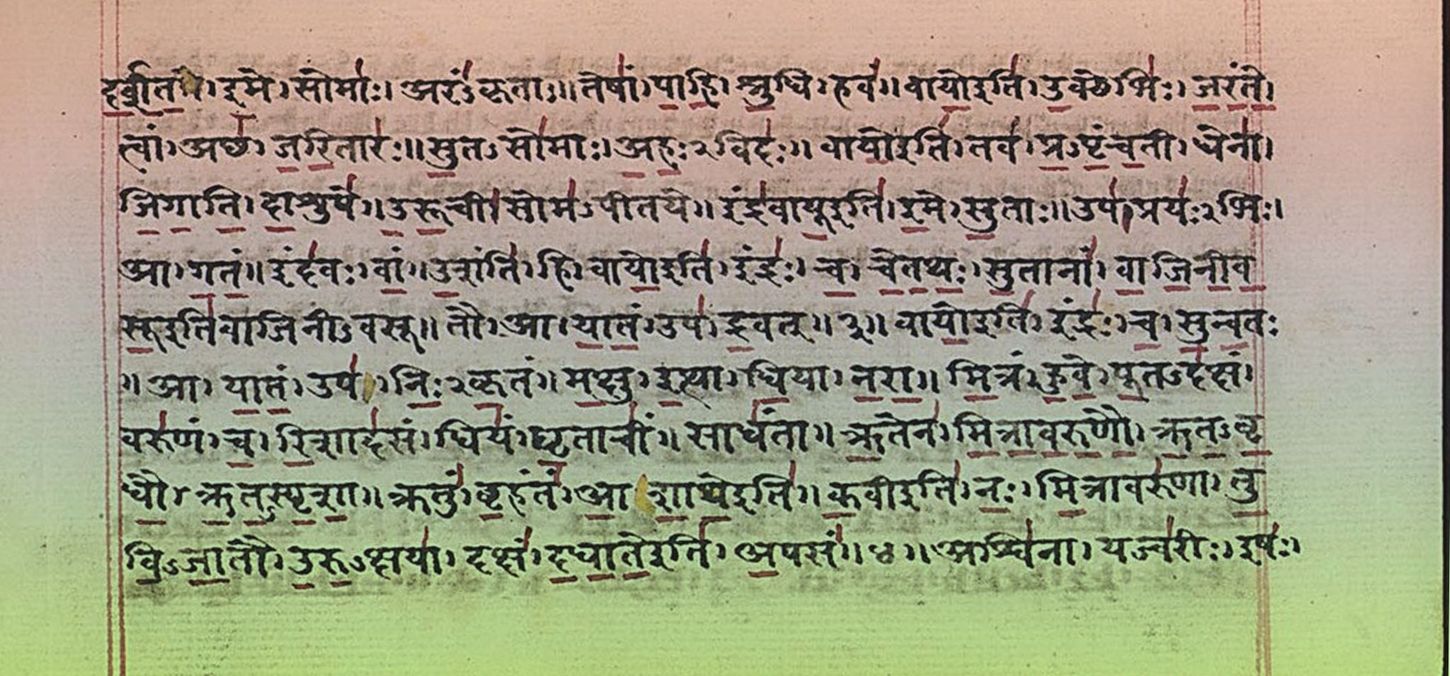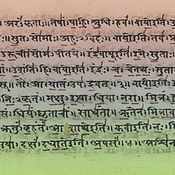
Lerne mit Dr. Ronald Steiner diesen Abschnitt genauer kennen.
Er erläutert den Sinn sowie den Text und Du kannst ihn mit ihm im Indra Vajrā Metrum rezitieren. Abschließend hast Du die Gelegenheit, den Sinnabschnitt in einer kleinen Meditation auf Dich wirken zu lassen. Hier geht es zum Video >>
Om. Die Brahmanlehrer sagen:
Was ist der Urgrund, was Brahman1? Woher sind wir?
Wodurch bestehn, und worin sind gegründet wir?
Von wem regiert, bewegen wir, ihr Weisen,
Uns in der Lust und Unlust Wechselständen?
Paul Deussen - 1897
| 1: | "Brahman" ist hier allgemeiner Name für "Prinzip", wie Kaush.4,1. Brh.2,1,1. Chând.6,11,1. Brh.4,1,2 fg. |
The Brahma-students say: Is Brahman the cause?1 Whence are we born? Whereby do we live, and whither do we go? O ye who know Brahman, (tell us) at whose command we abide, whether in pain or in pleasure?
Max Müller - 1879
| 1: | This translation seems the one which Saṅkara himself prefers, for on p. 277, when recapitulating, he says, kim brahma kâranam âhosvit kâlâdi. In comparing former translations, whether by Weber, Roer, Gough, and others, it will be seen that my own differs considerably from every one of them, and differs equally from Saṅkara's interpretation. It would occupy too much space to criticise former translations, nor would it seem fair, considering how long ago they were made, and how imperfect were the materials which were then accessible. All I wish my readers to understand is that, if I differ from my predecessors, I do so after having carefully examined their renderings. Unfortunately, Roer's edition of both the text and the commentary is often far from correct. Thus in the very first verse of the Svetâsvatara-upanishad, I think we ought to read sampratishthâh, instead of sampratishthitâh. In the commentary the reading is right. Vyavasyâm is a misprint for vyavasthâm. In the second verse we must separate kâlah and svabhâvah. Yadrikhhâ no very unusual word, meaning chance, was formerly taken for a name of the moon! Instead of na tvâtmabhâvât, both sense and metre require that we should read anâtmabhâvât, though the commentators take a different view. They say, because there is a self, and then go on to say that even that would not suffice. Such matters, however, belong to a critical commentary on the Upanishads rather than to a translation, and I can refer to them in cases of absolute necessity only, and where the readings of the two MSS., A. and B, seem to offer some help. |
Sind Zeit, Natur, Notwendigkeit, der Zufall,
Grundstoffe, Geist, ist die Verbindung dieser
Als Urgrund denkbar? Doch nicht! - Denn ein Selbst ist!
Doch auch das Selbst schafft frei nicht Lust und Unlust!1
Paul Deussen - 1897
| 1: | Alle aufgezählten Prinzipien können nicht für sich allein, sondern nur als Bestimmungen an einem Selbste ( tman) gedacht werden, welches daher unter allen Umstanden der Urgrund ist. Aber das empirische Selbst kann dieser Urgrund nicht sein, da es nicht Herr ist, Lust und Schmerz zu schaffen, sondern ihnen unterworfen ist. |
Should time, or nature,1 or necessity, or chance, or the elements be considered as the cause, or he who is called the person (puruṣa, vijñānātmā)? It cannot be their union either, because that is not self-dependent,2 and the self also is powerless, because there is (independent of him) a cause of good and evil.3
Max Müller - 1879
| 1: | Svabhâva, their own nature or independent character. |
| 2: | Union presupposes a uniter. |
| 3: | tmâ is explained by Saṅkara as the gîvah, the living self, and as that living self is in his present state determined by karman, work belonging to a former existence, it cannot be thought of as an independent cause. |
Nachdenken und Hingebung (yoga) übend, sah'n sie
Gottes Selbstkraft, verhüllt in eignen Guna’s2
Er ist's, der allen den genannten Gründen,
Nebst Zeit und Seele, vorsteht als der Eine.
Paul Deussen - 1897
| 2: | Die individuelle Seele besteht nicht aus dem Purusha und der von ihm unabhängigen Prakriti (Shakti) nebst deren Guna's (Sattvam, Rajas, Tamas), sondern es ist Gottes eigene Kraft (âtma-shakti), welche, in ihre eigenen Qualitäten (svagunaih) verhüllt, als Seele erscheint. – Schärfer kann der Gegensatz gegen die Sânkhyalehre wohl nicht ausgesprochen werden. |
The sages, devoted to meditation and concentration, have seen the power belonging to God himself, 1hidden in its own qualities (guṇa). He, being one, superintends all those cause, time, self, and the rest. 2
Max Müller - 1879
| 1: | Devâtmasakti is a very important term, differently explained by the commentators, but meaning a power belonging to the Deva, the Îsvara, the Lord, not independent of him, as the Sâṅkhyas represent Prakriti or nature. Herein lies the important distinction between Vedanta and Sânkhya. |
| 2: | Kâlâtmabhyâm yuktâni, kâlapurushasamyuktâni svabhâvâdini. tman is here taken as synonymous with purusha in verse 2. |
-
Hallo zusammen, gibt es eine bestimmte Literatur / Quelle, welche ihr für das Studieren der Upanishaden empfehlen würdet, auch in Vorbereitung auf den kommenden Schwerpunkt im September (Ausbildung)? [...] Hallo zusammen, gibt es eine bestimmte Literatur / Quelle, welche ihr für das Studieren der Upanishaden empfehlen würdet, auch in Vorbereitung auf den kommenden Schwerpunkt im September (Ausbildung)? :-) Liebe Grüsse, Romy
-
Paul Deussen - 60 Upanishads
- Doch an sich hast Du hier die komplette Übersetzung und Kommentar.
und im eLearning wird alles auch nochmal aufgearbeitet. Paul Deussen - 60 Upanishads
- Doch an sich hast Du hier die komplette Übersetzung und Kommentar.
und im eLearning wird alles auch nochmal aufgearbeitet.
-
-

Sarah Brunner
am 19.09.2022dankeschön... es tut so gut immer wieder und immer wieder einen kleinen Schritt weiter zum Selbst zum Sein zum Atman ... namasté dankeschön... es tut so gut immer wieder und immer wieder einen kleinen Schritt weiter zum Selbst zum Sein zum Atman ... namasté
-
Danke Dir Danke Dir
-



 Dr. Ronald Steiner
Dr. Ronald Steiner
 Nils Jacob Liersch
Nils Jacob Liersch



Nachrichten und Bewertungen